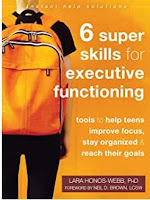EAT THAT FROG! FOR STUDENTS by Brian Tracy with Anna Leinberger has a truly attention-grabbing title, doesn’t it? The authors (a motivational speaker and a former high school teacher) build on previous works written for a business setting in order to outline “22 Ways to Stop Procrastinating and Excel in School.” For example, they concentrate on actionable steps and begin with three key pillars: self-esteem, personal responsibility, and setting goals. Subsequent sections review structuring time, establishing a study pattern, and handling the pressure to achieve. There is a separate section on stress which advocates planning ahead, preparation and the intentional use of technology. All good ideas, of course. I especially like the emphasis on tackling your major task first; however, I do wish there were more diagrams and images so as to create a more engaging space for potential teen readers. (Berrett-Koehler) 3 stars6 SUPER SKILLS FOR EXECUTIVE FUNCTIONING by Lara Honos-Webb is one of my favorites in this group of posts and is right on target for executive functioning skills as it aims to provide “Tools to Help Teens Improve Focus, Stay Organized, and Reach Their Goals.” The six super skills discussed in the text are finding gifts, setting goals, chunking, boosting motivation, managing moods, and finding focus; all are key as we try to help students navigate remote learning. Honos-Webb, a clinical psychologist who has written several books about ADHD, notes that “research shows that self-discipline predicts your grades twice as much as IQ [does]”and she also points out how difficult it is to learn when one is especially anxious. Most schools are seeing an increase in failing (or near failing grades) and I think using some of the mini-exercises here (during advisery or homeroom time?) could really have a positive impact by increasing self-awareness and helping to reduce anxiety. Honos-Webb defines executive functioning and describes the importance of attention, planning, flexible thinking, emotional regulation, and impulse control. If nothing else, this text could build a vocabulary and mental checklist that will really benefit readers and students as they transition to lifelong learners. (New Harbinger) 4.5 stars ordered
Tuesday, December 22, 2020
Organization and Motivation ... part 1
We have all seen the news in the past few months about the
difficulty that students are having with motivation and managing their workload
in a remote learning environment. Of course, we see some of these issues every
year with teenagers since learning how to learn is one of the most important
skills we teach and reinforce. Therefore, I am posting reviews of a number of new books from different
publishers (several small ones, included) which offer tips, tricks, and advice
for setting goals (a common theme) and avoiding procrastination. Some are directed at students themselves and others to the concerned adults in their lives.
Subscribe to:
Post Comments (Atom)
Welcome to Continuing the Conversation!
We are in the midst of migrating book reviews to this new blog. To see past reveiws and comments, please visit Book Talk ... A Conversation...
-
THE LISTENERS is a mix of historical fiction, sprinkled with magic, and romance as well as being the adult debut from the best-selling youn...
-
THE LOST PASSENGER by Frances Quinn is a work of historical fiction set primarily from 1910 to 1916 and features a young woman named El...
-
THE ENGLISH MASTERPIECE by Katherine Reay is described by the publisher as “perfect for fans of Kate Quinn and Ariel Lawhon .” Given that ...





No comments:
Post a Comment